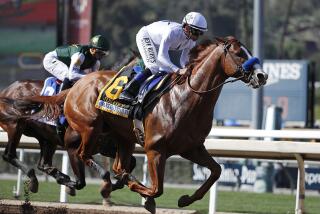Panel rules against Landis
An arbitration panel has ruled against Tour de France champion Floyd Landis on two procedural issues, complicating his defense against charges that he illicitly doped with testosterone during the 2006 race.
By a 2-1 vote, with the arbitrator appointed by Landis, attorney Christopher Campbell, in the minority, the panel gave U.S. anti-doping officials permission to retest samples of Landis’ urine that have already been ruled clean. But they said they would rule later on whether to accept the new results as evidence.
The panel also turned down Landis’ request to take depositions of personnel at the French government anti-doping lab that declared him guilty last summer.
Campbell objected that allowing the U.S. Anti-Doping Agency to retest the samples at the same Paris lab, which has an incentive to validate its original charge against Landis, “strips this adjudication of the appearance of fairness.”
Landis’ attorneys said Wednesday they were considering whether to appeal the decision to federal court.
USADA is prosecuting the case against Landis, with a hearing before the arbitration panel set to begin May 14 in Malibu. If the arbitrators uphold the charge and a further appeal is turned down, Landis will face a two-year suspension and the loss of his Tour de France title.
Separately, it was disclosed Wednesday that USADA has demanded from Landis a large volume of medical records as well as financial records of his legal defense fund, including the names of all donors of more than $250.
The agency also demanded records of “any comments” made by Landis regarding his “opinions and or concerns regarding doping in the sport of cycling” or the anti-doping system, including comments he has made about USADA or the World Anti-Doping Agency.
In a written statement, Landis called the request “harassment” and “an invasion of my privacy.”
USADA officials did not return calls for comment Wednesday.
The procedural ruling was made March 17 but only released Wednesday. At issue was USADA’s plan to test seven samples of Landis’ urine from the 2006 Tour de France that had already been ruled clean. USADA wishes to subject the samples to an ostensibly more rigorous test than had been done.
The new tests were to be performed on B samples, which are kept in storage and checked only if the primary samples drawn at the same time, known as A samples, are deemed positive. Under anti-doping rules, the A and B samples must test positive for an athlete to be charged with doping.
In the Landis case, most of the A samples were discarded after they tested negative. Because the B tests therefore could not be used to establish a doping violation, Landis argued, the results should not be introduced as evidence.
He further objected to USADA’s plan to have the testing done at the Paris laboratory, because the core of Landis’ defense is a challenge to the lab’s proficiency and integrity.
“To have the very lab whose performance is at issue validate the results” creates a conflict of interest “on steroids,” said Maurice Suh, one of Landis’ attorneys.
The arbitrators said they had no jurisdiction to prevent USADA from testing any samples in its possession. They said they would not allow the results to form the basis of any new charges against Landis and reserved judgment on whether to accept the results as evidence.
The panel also said it had no authority to compel employees of the Paris lab to give the depositions Landis requested. The cyclist contends that such pre-hearing questioning will support his contention that the lab mishandled his samples and tampered with documents.
More to Read
Go beyond the scoreboard
Get the latest on L.A.'s teams in the daily Sports Report newsletter.
You may occasionally receive promotional content from the Los Angeles Times.










